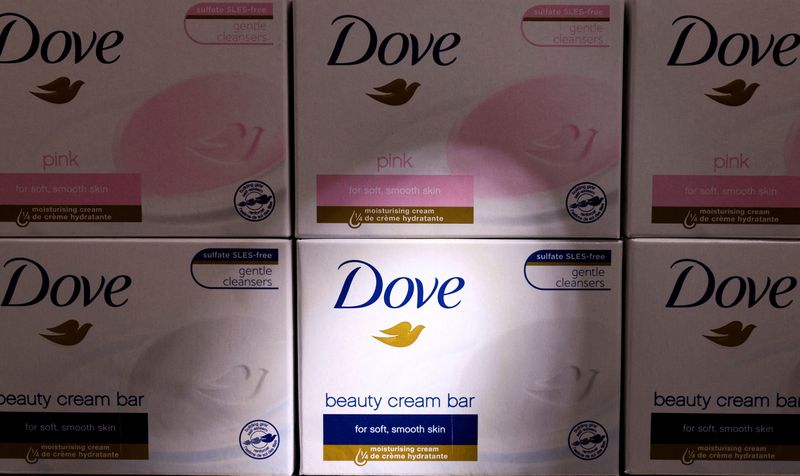LONDON (Reuters) -Unilever on Tuesday beat underlying sales growth forecasts after again raising prices to offset higher costs, boosting shares in the maker of Dove soap and Ben & Jerry’s ice cream.
The British company reported a 7.9% rise in underlying second-quarter sales, beating analysts’ average forecast of 6.4%, a company-provided consensus showed.
The company said it expects underlying sales growth for the full year to be above 5%, ahead of its multi-year range, with underlying price growth continuing to moderate through the year.
“My early immersion in the business has confirmed my belief in Unilever’s strong fundamentals,” new CEO Hein Schumacher said in a statement. These are Schumacher’s first Unilever results, having taken over from Alan Jope earlier this month.
Underlying price growth for the second quarter was 8.2% while underlying volumes fell by 0.3%, beating analysts’ expectations of 7.7% and a drop of 1.2%, respectively.
Shares in Unilever were up 3.9% at 4,175 pence as of 0801 GMT, having gained 5% after the results.
“It’s a nice positive surprise because margins have come in at 17.1%,” said Jochen Kurz, fund manager at German Unilever investor Kahler & Kurz Capital, referring to the company’s first-half underlying operating margin.
“But if you look beyond that, the old CEO Alan said he expected margin expansion in 2023 and 2024 – we haven’t seen that so far, we have basically seen a flat operating margin.”
“Unilever could do much better,” Kurz added.
Unilever said it expects net material inflation for 2023 to be around 2 billion euros of which 400 million is anticipated in the second half.
In February it had forecast net material inflation for the first half at around 1.5 billion euros, saying it would continue to raise prices in the first half of the year and ease up on those hikes in the second half.
“We’re past peak inflation now, but there will continue to be a high level of pricing growth within our reported numbers,” finance chief Graeme Pitkethly said on a call with journalists on Tuesday. “The majority of pricing you’ll see is carry forward pricing as we roll through the quarters.”
“Where we’re really shifting the business in terms of focus is towards volume growth,” he said, adding it “remains quite volatile and uncertain but we’re definitely trending in the right direction.”
MARKET SHARE SQUEEZE
Top U.S. and European investors told Reuters this month that they are flagging their concerns about high prices to consumer goods companies, with Janus Henderson going so far as to cut some stakes it holds and shorting food makers it believes are at risk of losing customers.
Unilever said the percentage of its “business winning market share” had reduced to 41%. The metric assesses what percentage of the company’s revenue is coming from areas in which it is gaining market share on a rolling 12-month basis.
“Bears will focus on the 41% competitiveness, 2nd lowest number ever disclosed – the third quarter of 2018 was 40%,” Bernstein analyst Bruno Monteyne said. “The company previously claimed that its leadership in taking up prices was causing some temporary market share losses, but that was 6 quarters ago.”
“To be losing market share nearly 60% of the time (on Unilever’s numbers – our data historically tracked worse than their published numbers), is a very bad performance, and rightly new CEO Hein Schumacher’s top priority.” The consumer goods industry has struggled with soaring costs for about two years, as everything from sunflower oil and shipping to packaging and grain has become more expensive. The higher costs began during the pandemic and took a turn for the worse after Russia invaded Ukraine, sending energy costs to record highs last year.
Rivals P&G and Nestle are set to report earnings results this week.
(Reporting by Richa Naidu; editing by Jason Neely)


